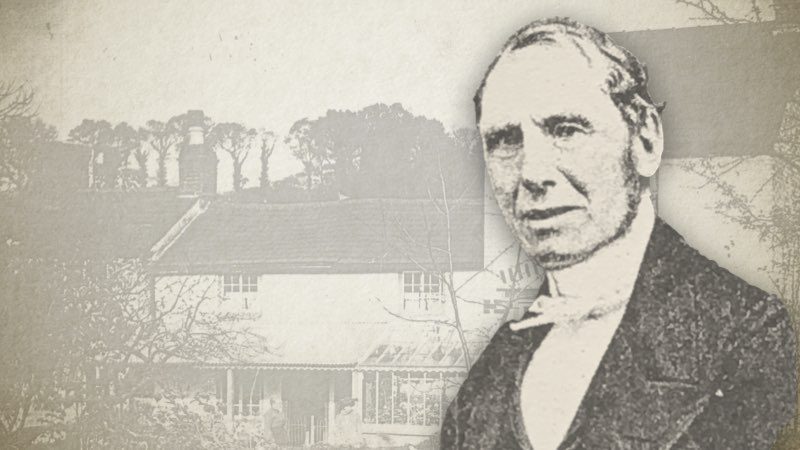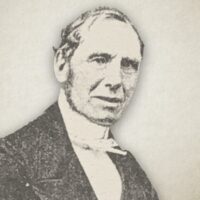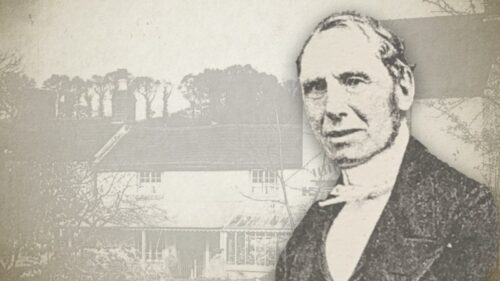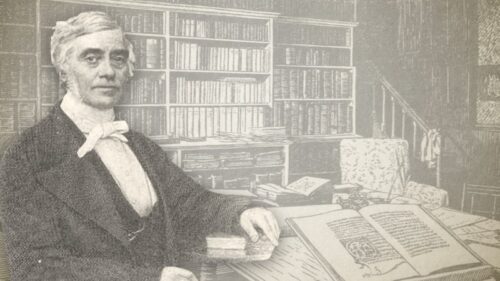
How Fair Is Thy Love
[Notes Of A Sermon By Mr. Francis Covell, Preached At Providence Chapel, Croydon, On Sunday Morning, December 9th, 1860.]
“Thou has ravished My heart, My sister, My spouse; thou hast ravished My heart with one of the thine eyes, with one chain of thy neck. How fair is thy love, My sister, My spouse! How much better is thy love than wine! And the smell of thine ointments than all spices!”—Solomon’s Song 4:9,10
This Song is called the “Song of Songs,” and we may indeed say it is the very best, for in it the Son of God has, as it were, opened all His heart, told us all His thoughts, and made known His mind and will. In it we may read of His delight in His poor people, and such things has He said in it to them that, unless He had said it, we could not have believed it. “It is too good,” we should have said, “to be true;” but He makes us believe it by speaking to our heart, and this brings us to say, “Thanks be unto God for His unspeakable gift.”
“Thou hast ravished My heart, My sister, My spouse.” When? When she was lying in her filth, guilt, and blood; when there was no eye to pity her, no heart to compassionate her. Then He tells her, “I passed by thee, and saw thee polluted in thine own blood. I said unto thee when thou wast in thy blood, Live;” for, says He, “When I passed by thee, thy time was a time of love, and I spread My skirt over thee, and entered into a covenant with thee, and thou becamest Mine.” Then “it was not for good deeds, good tempers, or frames.” No, my friends, but springing from His rich and sovereign love, in which He makes known that truth, “I will have mercy on whom I will have mercy, and be gracious to whom I will be gracious;” so He passed by angels, more lofty spirits than ours, and laid hold of and had a delight in dust and ashes—sinful, vile, and guilty worms. “And is this the manner of man, O Lord? Will God open His eyes upon such an one? Will the blessed Son of God have His heart so taken with such creatures as us as to say, “Thou hast ravished My heart?”
And, my friends, He will make us believe this is true. Blessed for ever be His matchless name that “His ways are not as our ways, neither are His thoughts as our thoughts.” But, till He came to make this known to you and me, saying, “My son, give Me thine heart,” we were in love with self, sin, and the world, and wedded to the law; and the language of our heart, when the blessed Son of God came to make Himself known to us, was, “We desire not the knowledge of Thy ways.” In our hearts we wanted Him to depart from us. We were so in love with ourselves and other things, that we had no room nor desire for Christ. But, “determined to save, He watched o’er our path.” Determined to do us good, He hedged up our way with thorns, and made a wall, that we could not find our own paths. He had determined to bring us to heaven, so He turned all other lovers out, and has brought (or is bringing) us to bow at His feet, and to say with our heart, “Set me as a seal upon Thine heart, as a seal upon Thine arm, for love is strong as death.”
Ah! my friends, it is true, and there are some of you know it. As I have just said, when He comes to woo us, and to espouse us to Himself, He finds our hearts running after other lovers—in love with ourselves, our own righteousness, resolutions, and performances. But, my friends, He has plunged you and me in the ditch, and made our own clothes to abhor us. Has He not made you feel that all your “righteousnesses are as filthy rags,” so that at times you have loathed your own works, and felt it, was of the Lord’s mercies you were not consumed? It is His work to drive us out of self and to win our hearts; and why? Because—
“Partial service is His loathing;
He requires pure desires,
All the heart or nothing.”
He will have it; and, my friends, when He begins to work thus in the heart, the sinner is willing for Him to have it; but when the blessed Spirit begins to show the man what a heart he has, his trouble is, lest the Lord will not have it. This makes the poor thing cry out, “Cleanse the very thoughts of my heart, and renew a right spirit within me;” so He comes thus to take our heart, that He may let us know how He loves us. He throws down this lordly self, with all its pretty works, in the dust, and down falls that Dagon god before the blessed Son of God. Poor thing, has He done it for you? Do you know what the poet means when he says—
“Drove out of myself, my own righteousness loathing,
To Christ, my dear Saviour, for shelter I go”?
What a mercy for you if you do! Well, while He has been doing it, there has been fear, anxiety, and trouble in the heart about it; nor could you believe at times that these were tokens of love to thee. But whom He loves He rebukes and chastens; and it is to bring thee to say, with all thy heart, “To whom shall we go? Thou hast the words of eternal life;” for He is so jealous of His people’s heart, He will bring them to confess this—“Other lords beside Thee have had dominion over us, but by Thee only will we make mention of Thy name.” Thus He will “circumcise our heart to love the Lord our God, that we may live;” and as His love flows out to us, our hearts will run up to Him.
“Thou hast ravished My heart, My sister, My spouse.” But He finds our hearts set on the world. “What a multitude of pretty things there are in the world, just suited to a carnal man and woman! Its gold and silver, its fashions and pride—take away these, and they would be ready to say, “You have taken away my gods, and what have I more?” How many are there even now before God in this little company that have thought more how to ornament themselves this morning than how their heart stood before God? How many were longer at the glass than they were upon their knees? If we were to take away this god, what have you else? “A meek and quiet spirit in the sight of God is of great price.” That is not much in the world’s estimation; but to see a man coming to Christ with a feeling, contrite heart, is in the sight of God of great price. Therefore, when the Son of God comes to take His spouse, who has been in love with the world, He takes away this god, and what has she left? When the Holy Ghost convinces the poor thing of sin, how it tarnishes all created things, and the soul feels and says, “Vanity of vanities, all is vanity!” “What shall a man give in exchange for his soul?” What will riches profit in the day of wrath? What will an outside appearance avail a naked soul before God? How the world begins now to go down in the poor sinner’s feelings, and “What shall I do to be saved” comes up. What a change is now wrought! In God’s light we see light, and we see the world will be burned up, and all things therein, and then, “what shall it profit a man, though he gain the whole world, and lose his own soul?” How he begins to feel that “one thing is needful,” and down goes the world, and he begins to look after and longs to know something about a crucified Jesus, a suffering Lord Jesus, a bleeding Jesus, a Saviour that can have mercy upon him, that can save him, and “deliver him from going down to the pit.” Now his affections begin to run towards God’s dear Son, but he cannot see all this while God is drawing him by His grace. Hence God says, “I taught Ephraim to go,” but he did not know that it was by God’s power he was going; so it is God’s power that draws the sinner from the world to Jesus’ blessed feet, to acknowledge Him as Lord of all, and to bless the Lord for His dear Son. Do you know something of this? If so, you begin to find out how little a place Jesus Christ has had in your heart, and what a slave you have been to sin.
Again, when the Son of God thus comes to espouse His dear people, and tell them what is in His heart towards them, He finds them all wedded to Moses. They are born under that covenant, and to their first husband they will cling, though they find they never can please him; and, unless God by His grace and power divorced them from him, they would live and die under his condemning rule and power. Old John Berridge has it perhaps better than I can put it forth. When the blessed Spirit laid hold of his heart and began to draw him to Himself, then John found he was wedded to Moses. He says—
“His snarling I bore for many a year,
Which grieved me sore, and drew a sad tear;
One folly committed no pardon will find,
And though much entreated, he still is unkind.”
That God’s people all know and sensibly feel, but they are so wedded to him they cannot give him up.
But the Son of God will have all the heart: “Thou hast ravished My heart.” But we think, while feeling these things in our heart, the Son of God will never have us in this condition. We want Moses to recommend us to the Lord Jesus Christ. Not so, my friends; the Son of God will have the whole heart, and will thus throw down everything but His blessed Self, and bring us to feel that He loved us because He would love us, and that, when we had no other to take us, help us, and save us, He would do it to purpose. This gets Him such a name in our hearts that I tell thee, if the blessed Son of God has not made Himself known to thee as thy King and Lord when He does so, He will get Himself such praise in your soul that you will say, “Let everything that hath breath praise the Lord.” You will feel what it is in reality to say, “Crown Him Lord of all”; and you will call upon every feeling of your heart to bless His matchless name for saving such a wretch as you feel yourself to be. If He has given you to see and feel what He is to you, and has thus scattered all other gods, and in His love and mercy won your heart and affections, your heart at times has leaped at the sound of His name, and you have felt with the poet—
“Jesus, I Jove Thy charming name;
‘Tis music to my ear.”
This could not be till all others were scattered, till you were driven from the world, and divorced from Moses; and then, when you least thought about it, He dropped His love into your heart. In the words of the text, or the substance of it, “Thou hast ravished my heart.” How clearly you saw and felt that by grace you were saved, through faith, and that not of yourself; it was the gift of God. What a place Christ has now got in your affection; and you can sing right heartily, “None but Jesus”; for it is His own right hand and holy arm “hath done it; not by might, nor by power, but by His own Spirit.” This is the way He conquers us by His grace, wins us to Himself, and we fall at His blessed feet, made willing in the day of His power. So you know something of what is wrapped up in the text, “Thou hast ravished My heart, My sister, My spouse.”
What a blessed union this is betwixt the Lord Jesus and His people! He calls them “His sister,” “His spouse”; and, as He is Son and Heir of God, so we are joint-heirs with Him; and as He is set down on His Father’s throne, so we shall sit with Him on His throne. Thus He makes His people to know again and again that He is a “Brother,” and one born for adversity too; and that there is an union betwixt Him and His people, according to that word, “I am the Vine, and ye are the branches.” As He is the Son, so we are sons and daughters of the Lord Almighty, we in Him, and He in us. Thus there is a blessed relationship existing between us, and God receives us in His name and for His sake. What a mercy it is to feel somewhat of the same spirit in our heart that was in His!
In the days of His flesh, when some of His friends came to Him and said, “Thy mother and brethren stand without, desiring to speak with Thee,” He looked upon His disciples, and said, “Who is My mother and My brethren? I say unto yon, that whosoever shall do the will of God, the same is My brother, and sister, and mother.” The Spirit that was upon the Son of God was “never to depart out of His mouth, nor out of the mouth of His seed, nor out of the month of His seed’s seed, from this time forth, even for ever;” so it ran from the blessed Son of God to all His seed, whereby they are united to Him in faith and love, and drink of the same Spirit.
If you want to know whether you really have any claim to relationship with God’s dear Son, I ask you, Has God conquered your will? Has He made you willing to be saved by Jesus Christ? Has God so swallowed up thy will in His will that thy will is God’s will? What a great thing this is! And beyond all this, is there not, at times, a falling into the hand of the Lord—“Shall I receive good at the hand of the Lord, and shall I not receive evil’’? And while at times you may find another will opposing this will, how does thy mind feel about it? Do you say, “I want my will swallowed up in God’s, but I find another running against it, so that I cannot do the things that I would; and God knows,” say you, “that it is so’’? Then thou art His sister, if thou hast thus drank into His Spirit. God has subjected thy will, though thy faith cannot lay hold of it. It requires a strong hand to lay hold of eternal life. But, though you cannot say that the Son of God acknowledges you to be His sister, it is far better to tremble about it than to say it in a presumptuous way. He will enable you to call to Him as your life and the length of your days. You shall taste His love and grace, and shall feel assured that you have an union to the Son of God. Thou art His sister, and though at times Satan may object many things against this, and tell thee to look at thyself, remember that he does this when we are in a bad state, when there is in us no softness of heart or humility of feeling. “Look,” he says, “what likeness have you to the Son of God, that you dare claim relationship to Him? These are none of the marks of it.” Then, if we have thought we had presumed in speaking upon these things, we have taken to ourselves a low place, and been ashamed of it. But all that Satan and our unbelief may say stands for nothing. After all this, I ask thee, have you not felt such a moulding of spirit, and conformity to God’s will and way, that you have dropped before Him, child-like, saying, “Lord, guide me! Lord, teach me! Lord, uphold me”? And you have thus so drank of the Spirit of the Son of God that you could say, “Not my will, but Thine be done.”
I was reading a little while back the life of Cowper, and when I read it, I could not at that time say what he did about consenting, if God so willed, to be banished from Christ, nor have I been able to say so since. But I have often felt that, if I stood at the solemn bar of Christ, and He should frown and say, “Depart!” I could not go. That is what I felt when I read of this man, and I said “If he were right, I have something yet to learn.” God, I know, brings our will to accord with His, and say, “Not mine, but Thine be done.” What a mercy for you and me that this Scripture is left!” If there be first a willing mind, it is accepted according to that a man hath.” If God the Holy Ghost has gained your heart, there is a willing mind to be what God would have you to be. Has He not, at times, made you kiss the Son, and bow to the will of thy God? If so, you are the character He is speaking to, though you may not be able confidently to lay hold of the relationship He bears to thee.
“Thou hast ravished My heart, My sister, My spouse.” There is not only relationship as a sister, but, as if that were not close enough, He adds, “My spouse.” Why, my friends, how “slow of heart” we are to believe all the Lord has said! While some of us are enabled to say and believe that our Maker is our Husband, “the Lord of hosts is His name,” yet we are apt to fear that we have a good deal more affection for our wives than the Son of God has for His. But He tells us, “All things work together for good;” and again, “I will do you good with My whole heart, and with My whole soul. I will never leave nor forsake you.” Then He comes again and again, and asks her, “Has anything failed of all God has promised?” No; yet we are so suspicious about His care towards us, whether He will not let us die in a Union, and bring a public disgrace on our name and profession, as if we had more care for ourselves than He has for us. The Son of God cares more about you than you do for yourself, for has He not often made you prove that, if He had let you have your way, you would have cut your fingers; and you have felt sure that, if He had let you alone, you would have run into the pit of destruction? But, “in His love and pity, He redeemed you, and carried you all the days of old;” and many times since then He has made His love known to your heart. When you have in your feelings and ways run away from Him, how He has come and reproved you, and brought you to acknowledge that you made crooked paths for your feet. Still He calls you, “My sister, My spouse.” If you and I had but faith to believe what we do believe, how we should be enabled to drop our care upon Him, and feel, ”He cares for us!” But, you see, we have not faith enough in His blessed Self. We sensibly feel what we read, that “without Him we can do nothing.” How slow of heart we are to believe; but notwithstanding this, we shall find, and prove too, that He watches over us and delights to do us good; and we shall have to confess at last that “goodness and mercy hath followed us all the days of our life,” and, as we prove His faithfulness and loving-kindness to be better than life, we shall be willing to go to heaven to praise Him for it all.
“My sister, My spouse.” And this is the mercy to every true believer, that there can be no divorcing them from Christ. None can disannul what God hath united. “Thine they were,” says the Son, “and Thou gavest them Me;” so there can be no separation. Satan may object, but that is nothing with Christ, who loves everlastingly. Has God united thee and His Christ together? What think you of Christ? What saith thy heart about Him? I ask whether, in faith, Christ is “All and in all” to thee? “Yes,” say you, “He is.” Has the Holy Spirit made you believe that Christ loves you? “Why,” say you, “I have felt sure sometimes in my heart that God loves me.” Then God has united you to Christ, and nothing can ever separate you from Him. You may lose the comfort of it, and you may have many things to object against it, and question whether it will stand. But, my friends, the Son of God once said, “What God hath joined together, let not man put asunder.” The Lord, the God of Israel, saith that He hateth putting away; so it still stands, and will stand, “My sister, My spouse.” And, notwithstanding all our hard thoughts at times against Him, His love has never altered from everlasting. Though you and I cannot at times believe it, He is doing us good with His whole heart and soul. He is crucifying us to the world, and bringing us to cleave closer to Him, that He may be our All in all; and as the Lord brings you and me again and again into trials and troubles, He brings us, in the long run, to drop them all upon Him, and in feeling to cleave closer to Him. “Who is this that cometh up from the wilderness, leaning upon her Beloved?’’ As we come into these things, we get more into His heart, and He gets more into ours; so that we come, in a little measure, to understand what Paul says, “Having a desire to depart and to be with Christ;” and He says, “Thou hast ravished My heart, My sister, My spouse; thou hast ravished My heart with one of thine eyes, with one chain of thy neck. How fair is thy love, My sister, My spouse? how much better is thy love than wine! and the smell of thine ointments than all spices!”
Francis Covell (1808-1879) was a Strict and Particular Baptist preacher. He was appointed the Pastor of Providence Chapel, Croydon, England.
Francis Covell Sermons





